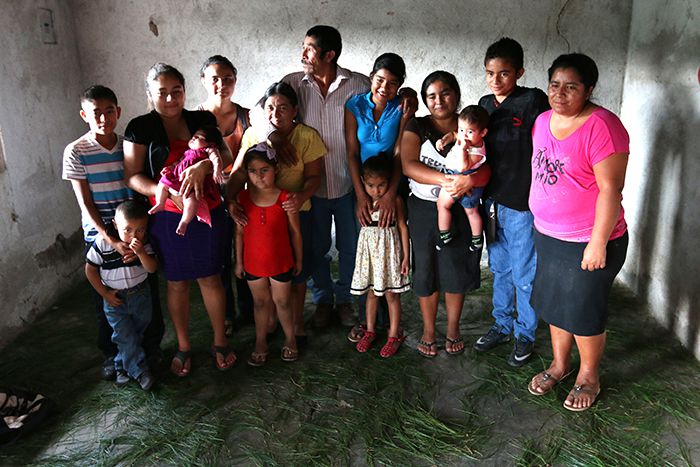This morning, we visited a community in rural Honduras where many Unbound-sponsored children live. I’m on a media trip with our culture columnist, Heather King, Sarah Dixon, assistant editor at the Southern Cross in Savannah, Ga., and Liz Quirin, editor of the Messenger in Belleville, Ill. We’re accompanied by Becky Spachek and Elizabeth Alex of Unbound, an international organization founded by lay Catholics to serve the marginalized.
They’ve been splitting up the group so that journalists have more time to ask questions. Also, by splitting up, twice as many communities get visits from journalists, and — get this — they actually like us.
Heather and I tagged along as Sarah Dixon visited the family of a 20-year-old woman she sponsors. We heard a lot about the ordinary life for the folks living in rural Honduras. This community in particular has benefited greatly from growing their own coffee — something that they just began five years ago. It’s changed their entire lifestyles. When coffee is not in season, they grow beans, corn and rice.
The mother of the family wakes up every day at 5:30 a.m., makes coffee and begins to grind the corn into tortillas as she cooks breakfast for her children. When coffee is in season, the kids are up by 6 a.m. and go to work the fields. She grinds more corn for lunch and dinner, cooks and cares for grandchildren if their mothers are in the field.
In this part of Honduras, school lets out for a couple months around Christmas so that the students can help their parents harvest coffee.
At lunch, I sat with the two teachers of the community’s school of 43 students. The two teachers — one who also serves as the principal — split six grades between them. They shared their frustrations with the education process and expressed an unfavorable view of the government.
They were particularly frustrated with the rate at which textbooks change. It seems to them that every time there's an election, they need new books. The teachers often have to buy the textbooks themselves since the students can’t afford them. And having them change so often is a great expense and doesn’t do much for consistency.
While the students get a two-month break starting around Christmas, some students don’t return until late March, after all the coffee has been cut. This puts them far behind. In a class where teachers are juggling three different grade levels, being a month late is next to impossible to make up.
These teachers said they knew of many families who have left the country, chasing the “American dream.” They’ve also seen many fathers leave for the U.S. who are never heard from again. The lack of gainful employment in agriculture is the main factor pushing migration from this part of Honduras.
The teachers also spoke about the problem created when a father leaves for the United States. Some do make it to the U.S. and send money to support the family. But even if they do beat the odds of the treacherous journey north, they leave their family fatherless, the teachers said. Kids might grow up with more money than their friends, but they grow up without a father. This makes them particularly vulnerable to gangs. Searching for the love that’s missing, many of these children seek it elsewhere.
The last visit was to a family with two Unbound-sponsored children. Maria and Julio, their parents, said having the help really makes a difference in the entire family dynamic. It was easy to witness. We met 14 members of the family, including some grandchildren.
Maria cooked delicious tamales for us, even though it wasn’t Christmas, and she made us some delicious coffee. Julio said he works regularly at a nearby field, harvesting onions, rice, beans and corn. His children work too, but they have to travel farther for it.
Someone from the group, I think it was Elizabeth, asked Julio what made him happy.
“This,” he said, looking around at his children and grandchildren. “Being with my family, together. That’s what makes me happy.”
